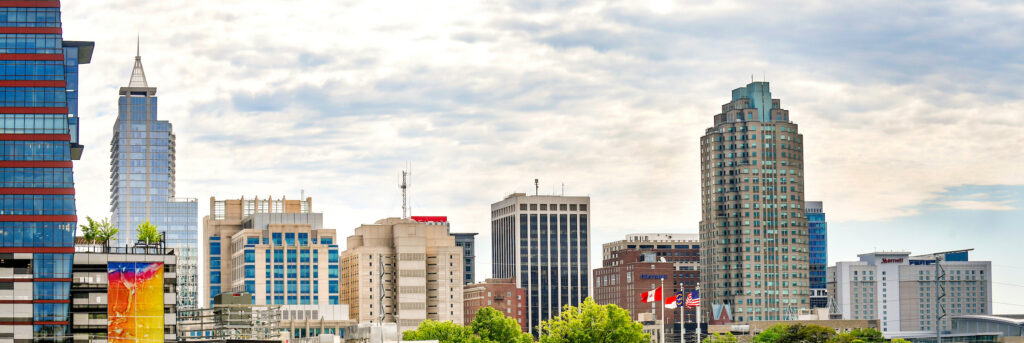
Park Scholars’ commitment to service is the motivating force behind their class legacy project, a way for students to make a significant contribution to a cause that will outlast their time at NC State. For their class legacy project, the Class of 2020 partnered with Urban Ministries of Wake County to provide commercial refrigerators and freezers for the organization’s food pantry. By reaching out to their network of friends and family, Park Scholars raised over $10,000 to purchase the equipment, which will improve Urban Ministries’ ability to distribute fresh produce and meat to people in need.
Since 1981, Urban Ministries has worked to meet the basic needs of those affected by poverty, focusing on food, medicine, and shelter. In addition to operating Wake County’s second-largest food pantry, Urban Ministries runs an Open Door Clinic, which serves the medical needs of more than 2,000 patients free of charge. Members of the Class of 2020 have volunteered at both facilities throughout their time at NC State.
According to Urban Ministries staff, the Park Scholars’ project will have an enduring impact on the Raleigh community. “The purchase of the new reach-in freezers and refrigerators by the Park Scholars has enabled us to source, store, and provide additional products to better serve our shoppers,” said Lisa Jones, director of crisis programs for Urban Ministries. “It is a lasting gift that will help us better serve our community.”
Dominick Carbone ‘20, co-chair of the Class Legacy Project Committee, explained that battling food insecurity was a major commitment for the class. “What I like most about this project is that we approached the issue of food insecurity in several ways,” said Carbone. “First, we provided the refrigerators and freezers to Urban Ministries, allowing their food pantry to run more efficiently and distribute more nutritious food. Second, we provided meaningful service to the organization throughout our time at NC State.”
Maggie He ‘20 is one of many Park Scholars who have volunteered with Urban Ministries. While interning in the food pantry, He noticed that volunteers and staff spent hours processing perishable food such as meat and produce, and identified the need for commercial refrigeration. She proposed the idea to her fellow Park Scholars, who were enthusiastic about the project.
“Everything Urban Ministries does is so sustainable, so they were a perfect partner for our class legacy project,” said He. Urban Ministries’ food pantry already serves as many as 50 families each day, so increasing their capacity could not have happened at a more crucial period. “We hope these fridges and freezers last for a really long time and serve the community well. Their needs are perfect for what we set out to fulfill.”
Volunteering with Urban Ministries offers Park Scholars the opportunity to work towards professional development goals through their service, and Park Scholars from other classes have gotten involved. Emma West ’21 and Ben Gray ’21 volunteer in Urban Ministries’ Open Door Clinic. West works as a volunteer phlebotomist, while Gray serves as a medical interpreter; the two Park Scholars frequently work together to serve patients.
Both West and Gray agree that their service experience with Urban Ministries has allowed them to hone professional skills and shaped their career interests. “Volunteering with Urban Ministries helped to confirm my interest in medicine,” said Gray, who has continued to provide medical interpretation services by phone during the COVID-19 pandemic. “You can see dramatic improvements in quality of life from very simple medical procedures.”
“My volunteer work enabled me to find my niche in health care interacting with patients, and helped me develop the ability to be calm and confident in the health care environment,” added West. “Volunteering with Urban Ministries helps us use our talents, like Ben’s ability to speak Spanish, and my skills in phlebotomy, to serve others. It also ties into our scholarly development in the health care field.”
For He, who will start a MedServe Fellowship after graduation, serving others has energized her for a career in medicine. “I feel more prepared because of all the opportunities I’ve had to interact with at-risk populations through Urban Ministries,” she said. “These skills cannot be taught in a classroom; you need to build confidence by doing.”
As the Class of 2020 leaves to apply their Think and Do education to new challenges, the impact of their service and class legacy project will resonate in the Raleigh community for years to come.